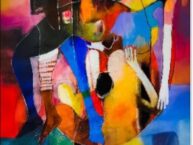
Chidima Anekwe is a Nigerian-American short story writer and essayist and two-time Pushcart Prize nominee. She is recently graduated from Yale University, where she studied English Literature. Her writing has appeared in or is forthcoming from MAYDAY, Torch Literary Arts, SWING, Chapter House Journal (formerly Mud City), The Madrid Review, and elsewhere. She has received scholarships and support from the GrubStreet Center and the SAEF Grant. She is currently based in Brooklyn and working at NYU.
Mma Madu Is a Patient Woman
A small throng of hopeful passengers waited patiently at the station. Mma Madu waited patiently at the station. Patiently, meaning irritably. But in a certain comported manner—for Mma Madu had tact. She understood how she was meant to behave. She was 65 years of age, a fact that she still had trouble believing. But she didn’t mind evoking its power in times of trouble, like when one might doubt whether or not she knew how to behave. She’d been on this earth long enough. She had every right to scold the petulant children of strangers when their foolish parents were too timid, or perhaps apathetic, to do so for themselves. She’d always wait of course and give them the chance to prove their ability. Patiently, meaning irritably.
The train was running over twenty minutes late.
Mma Madu had a child of her own. A daughter, now 35 years of age. She worked abroad in the sales industry and rarely came home to visit. On account of the distance, the expensive airfare, general busyness. It was quite common for one not to see their child for years on end, you understand. Mma Madu understood. She would be seeing her daughter that very day, at the very least. She had no reason to complain.
And her daughter had picked a fair place to relocate. She wasn’t impartial to London. There were lots of other Nigerians in the city, though most of them were Yoruba rather than Igbo like herself, it appeared. She appreciated this fact nevertheless, though she tried not to think too long or hard about the implications of Nigerians always being everywhere besides home. But the people in London were straightforward. Mma Madu rarely had to worry about whether or not a waitress or cashier was being insincere when they spoke to her. There was rarely small talk to interrogate. She had little doubt this was the general experience.
An announcement over an intercom stated there’d be another fifteen minutes delay. Until this point, Mma Madu had remained standing with her suitcase, out of principle. She was not some frail, aging woman who couldn’t handle waiting on two feet. But upon hearing the announcement, Mma Madu relented. She found a spot on the bench and settled herself into it. There was a pimply teenage girl one meter away, and she reminded her of her daughter. She had never been a terribly good-looking sort of girl. She hadn’t been fortunate enough to inherit her mother’s features. Mma Madu recognized this, though not with any degree of self-aggrandizement. It disheartened her.
The girl caught the sense of Mma Madu’s staring at her, and met her eye. Mma Madu offered her a kind smile. The girl swiftly went back to reading something on her phone. Mma Madu sighed.
She remembered when she was young, and her smile used to elicit ones like it in return. She had been quite the beauty. She still was, she’d like to think, though she admitted coming to this conclusion vis-à-vis her appearance now required a lot more thought and deliberation for the common onlooker. Nevertheless, she’d been a real catch in her prime, indeed.
Sometimes she lay in bed at night and thought of all the men she could have slept with and never did, and now never would, if she hadn’t been too cowardly or too proud or too satisfied too soon.
Or of how a dark part of her had always known her husband would grow tired of her the year her forehead began to wrinkle and she would be forced to make regular trips to the drugstore in search of black hair dye, of how she wished she hadn’t married the first man to knock on her parents’ door, of the guilt in understanding this would mean her daughter had never been born, of how her daughter maybe resented her for having allowed it all to happen anyway, despite the outcome of her birth. Of how her daughter still wasn’t married at 35 and maybe it was because she never did have her mother’s looks, and for this she did pity her, but sometimes it felt like her daughter wasn’t married because she pitied her, instead. And this made her sick.
Mma Madu prayed the train would arrive at last. She wasn’t getting any younger.


